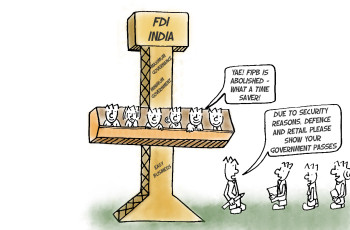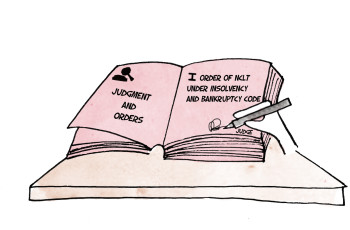SARFAESI (Amendment) Act, 2016 – A New Life for Banks and other Secured Creditors
Prelude:
The Securitisation and Reconstruction of Financial Assets and Enforcement of Security Interest (Amendment) Act, 2016 was introduced to amend the Securitisation and Reconstruction of Financial Assets and Enforcement of Security Interest Act, 2002 (SARFAESI Act),the Recovery of Debt due to Banks and Financial Institutions Act, 1993, the Indian Stamp Act, 1899, and the Depositories Act, 1996, and for matters connected therewith or incidental thereto.
Amendments to SARFAESI Act, 2002:
In wake of rising Non Performing Assets (NPAs) among the Indian Banks and Financial Institutions the Government of India has made major amendments to the existing SARFAESI Act, 2002 to expedite and strengthen the recovery process from the defaulting borrowers. Some of the major amendments that have been introduced amongst others are dealt herein:
1. Amendments to Section 2 of the Act:
(i) The existing definition of Default under Clause (j) of Section 2 has been substituted to bring within its ambit the non-payment of debt due to Debenture holders.
(ii) The existing definition of Financial Asset under Clause (l) of Section 2 has been substituted to include the following:
- Any beneficial right, title or interest created in any tangible asset given on hire or financial lease or conditional sale or under any other contract which secures the obligation to pay any unpaid portion of the purchase price of such asset or an obligation incurred or credit otherwise provided to enable the borrower to acquire such tangible asset; or
- Any right, title or interest created on any intangible asset or licence or assignment of such intangible asset, which secures the obligation to pay any unpaid portion of the purchase price of such intangible asset or an obligation incurred or credit otherwise extended to enable the borrower to acquire such intangible asset or obtain licence of the intangible asset; or.
(iii) The existing definition of Financial Institution under Clause (m) of Section 2 has been amended by including Debenture Trustee and Asset Reconstruction Company.
(iv) The existing definition of Secured Creditor under Clause (zd) of Section 2 has been substituted to include Asset Reconstruction Company, Debenture Trustee and other Trustee holding securities on behalf of a bank or financial institution in whose favour security interest is created by the borrower for due repayment of any financial assistance.
(v) The existing definition of Security Interest under Clause (zf) under Section 2 has been substituted to broaden its base to include the following
- Any mortgage, charge, hypothecation, assignment or any right, title or interest of any kind, on tangible asset, retained by the secured creditor as an owner of the property, given on hire or financial lease or conditional sale or under any other contract which secures the obligation to pay any unpaid portion of the purchase price of the asset or an obligation incurred or credit provided to enable the borrower to acquire the tangible asset; or
- Such right, title or interest in any intangible asset or assignment or licence of such intangible asset which secures the obligation to pay any unpaid portion of the purchase price of the intangible asset or the obligation incurred or any credit provided to enable the borrower to acquire the intangible asset or licence of intangible asset.
2. Exemption from Stamp Duty:
Now any document executed by any bank or financial institution in favour of the asset reconstruction company acquiring financial assets for the purposes of asset reconstruction or securitization shall be exempted from stamp duty in accordance with the provisions of Section 8F of the Indian Stamp Act, 1899.
3. Raising of Fuds by ARCs from Non-Institutional Investors:
Now any ARCs may after acquisition of any financial asset, offer security receipts to qualified buyers or such other category of investors including Non-Institutional Investors as may be specified by the Reserve Bank of India.
4. Enforcement of Security Interest by Debenture Trustees:
A new Sub-Section (2) has been added in Section 13 which gives powers to the Debenture Trustee to enforce the security interest in the same manner as provided for Secured Creditors.
5. Time Limit to pass orders for the purpose of taking possession of the Secured Assets:
Now the Chief Metropolitan Magistrate or the District Magistrate as the case may be, shall pass suitable orders for the purpose of taking possession of the secured assets within a period of thirty days from the date of application.
6. Integration of Registry:
The Central Government may for the purpose of providing a central database in respect of Security Interest shall in consultation with State Governments or other authorities operating registration system for recording rights over any property or creation, modification or satisfaction of any security on such property, integrate the registration records of such registration systems with the records of Central Registry.
7. Insertion of Chapter IVA:
A New Chapter IVA has been added after Section 26A which contains Sections 26B to 26E:
a. Section 26B – Registration by Secured Creditors and other Creditors:
- Now any creditor including the Secured Creditor may file particulars of transactions of creation, modification or satisfaction of any security interest with the Central Registry.
- A creditor other than the Secured Creditor filing particulars of transactions of creation, modification and satisfaction of Security Interest over properties created in its favour shall not be entitled to exercise any right of enforcement of securities under the Act.
- Every Authority or officer of the Central or State Government entrusted with the function of recovery of tax or other government dues and for issuing order for attachment of any property of any person liable to pay tax or Government dues, shall file with the Central Registry such attachment order with particulars of the assesse.
- If any person, having claim against any borrower, obtains orders for attachment of property from any court or other authority empowered to issue attachment order, such person may file particulars of such attachment order with Central Registry.
b. Section 26C – Effect of registration of transactions:
- All transactions which are registered under the provisions of the Act shall be deemed to be a public notice from the date and time of filing of particulars of such transactions.
- Where security interest or attachment order upon any property in favour of the Secured Creditor or any other creditor are filed for the purpose of registration under the provisions of the Act, the claim of such Secured Creditor or other creditor holding attachment order shall have priority over any subsequent security interest created upon such property and any transfer by way of sale, lease or assignment or licence of such property or attachment order subsequent to such registration, shall be subject to such claim.
c. Section 26D – Condition on enforcement of securities:
Secured Creditors shall not be entitled to exercise their rights of enforcement of securities unless the security interest created in its favour by the borrower has been registered with the Central Registry.
d. Section 26E – Priority of secured creditors:
- After registration of security interest, the debts due to any Secured Creditor shall be paid in priority over all other debts and all revenues, taxes, cesses and other rates payable to the Central Government or State Government or local authority.
- However, in cases where insolvency or bankruptcy proceedings are pending in respect of secured assets of the borrower, priority to secured creditors in payment of debt shall be subject to the provisions of the Insolvency and Bankruptcy Code, 2016.
Conclusion:
The Amendments seeks expedite recovery of dues by the Secured Creditors including Debenture Trustee. It is remedy in law which will definitely help Banks and other Financial Institutions to enforce their security interest in order to reduce the alarming NPAs. The introduction of Central Registry will help to consolidate and create a single large data base on registration of Security Interest. Further, on registration the Secured Creditor shall have priority over all other debts of the borrower including government taxes.
Celebrity endorsers likely to face fine and imprisonment for misleading advertisements
The Companies (Management and Administration) Rules,2014
Leave a comment
You must be logged in to post a comment.









 He holds a Bachelor’s and Master’s Degree in Corporate Secretaryship and a Degree in Law. He is a Fellow member of the Institute of Company Secretaries of India and an Associate Member of the Corporate Governance Institute, UK and Ireland. He has also completed a program from ISB on ‘Value Creation through Mergers and Acquisitions.
He holds a Bachelor’s and Master’s Degree in Corporate Secretaryship and a Degree in Law. He is a Fellow member of the Institute of Company Secretaries of India and an Associate Member of the Corporate Governance Institute, UK and Ireland. He has also completed a program from ISB on ‘Value Creation through Mergers and Acquisitions. Mr P Muthusamy is an Indian Revenue Service (IRS) officer with an outstanding career of 30+ years of experience and expertise in all niche areas of Indirect Taxes covering a wide spectrum including GST, Customs, GATT Valuation, Central Excise and Foreign Trade.
Mr P Muthusamy is an Indian Revenue Service (IRS) officer with an outstanding career of 30+ years of experience and expertise in all niche areas of Indirect Taxes covering a wide spectrum including GST, Customs, GATT Valuation, Central Excise and Foreign Trade. During his judicial role, he heard and decided a large number of cases, including some of the most sensitive, complicated, and high-stake matters on insolvency and bankruptcy, including many cases on resolution plans, shareholder disputes and Schemes of Amalgamation, De-mergers, restructuring etc.,
During his judicial role, he heard and decided a large number of cases, including some of the most sensitive, complicated, and high-stake matters on insolvency and bankruptcy, including many cases on resolution plans, shareholder disputes and Schemes of Amalgamation, De-mergers, restructuring etc., Ms. Sarah Abraham has been enrolled with the Bar Council of Tamil Nadu since 1998. Her areas of practice include Shareholder Disputes, Corporate Compliances, Mergers and Acquisitions, Private Equity/ Venture Capital Agreements and allied disputes, Information Technology Contracts, Intellectual Property, General Commercial Agreements, Litigation, Arbitration and Mediation.
Ms. Sarah Abraham has been enrolled with the Bar Council of Tamil Nadu since 1998. Her areas of practice include Shareholder Disputes, Corporate Compliances, Mergers and Acquisitions, Private Equity/ Venture Capital Agreements and allied disputes, Information Technology Contracts, Intellectual Property, General Commercial Agreements, Litigation, Arbitration and Mediation. A K Mylsamy is the Founder, Managing Partner and the anchor of the firm. He holds a Degree in law and a Degree in Literature. He is enrolled with the Bar Council of Tamil Nadu.
A K Mylsamy is the Founder, Managing Partner and the anchor of the firm. He holds a Degree in law and a Degree in Literature. He is enrolled with the Bar Council of Tamil Nadu. M Subathra holds a Degree in law and a Master’s Degree in International Business Law from the University of Manchester, United Kingdom. She is enrolled with the Bar Council of Tamil Nadu.
M Subathra holds a Degree in law and a Master’s Degree in International Business Law from the University of Manchester, United Kingdom. She is enrolled with the Bar Council of Tamil Nadu. Mr. K Rajendran is a former Indian Revenue Service (IRS) officer with a distinguished service of 35 years in the Indirect Taxation Department with rich experience and expertise in the fields of Customs, Central Excise, Service Tax and GST. He possesses Master’s Degree in English literature. Prior to joining the Department, he served for the All India Radio, Coimbatore for a period of about 4 years.
Mr. K Rajendran is a former Indian Revenue Service (IRS) officer with a distinguished service of 35 years in the Indirect Taxation Department with rich experience and expertise in the fields of Customs, Central Excise, Service Tax and GST. He possesses Master’s Degree in English literature. Prior to joining the Department, he served for the All India Radio, Coimbatore for a period of about 4 years. An MBA from the Indian Institute of Management, Calcutta, and an M.Sc. in Tourism Management from the Scottish Hotel School, UK, Ashok Anantram was one fo the earliest IIM graduates to enter the Indian hospitality industry. He joined India Tourism Development Corporation (ITDC) in 1970 and after a brief stint proceeded to the UK on a scholarship. On his return to India, he joined ITC Hotels Limited in 1975. Over the 30 years in this Organisation, he held senior leadership positions in Sales & Marketing and was its Vice President – Sales & Marketing. He was closely involved in decision making at the corporate level and saw the chain grow from a single hotel in 1975 to a very large multi-brand professional hospitality group.
An MBA from the Indian Institute of Management, Calcutta, and an M.Sc. in Tourism Management from the Scottish Hotel School, UK, Ashok Anantram was one fo the earliest IIM graduates to enter the Indian hospitality industry. He joined India Tourism Development Corporation (ITDC) in 1970 and after a brief stint proceeded to the UK on a scholarship. On his return to India, he joined ITC Hotels Limited in 1975. Over the 30 years in this Organisation, he held senior leadership positions in Sales & Marketing and was its Vice President – Sales & Marketing. He was closely involved in decision making at the corporate level and saw the chain grow from a single hotel in 1975 to a very large multi-brand professional hospitality group. Mani holds a Bachelor Degree in Science and P.G. Diploma in Journalism and Public Relations. He has a rich and varied experience of over 4 decades in Banking, Finance, Hospitality and freelance Journalism. He began his career with Andhra Bank and had the benefit of several training programs in Banking.
Mani holds a Bachelor Degree in Science and P.G. Diploma in Journalism and Public Relations. He has a rich and varied experience of over 4 decades in Banking, Finance, Hospitality and freelance Journalism. He began his career with Andhra Bank and had the benefit of several training programs in Banking. Mr. Kailash Chandra Kala joined the Department of Revenue, Ministry of Finance as ‘Customs Appraiser’ at Mumbai in the year 1993.
Mr. Kailash Chandra Kala joined the Department of Revenue, Ministry of Finance as ‘Customs Appraiser’ at Mumbai in the year 1993.
 S Ramanujam, is a Chartered Accountant with over 40 years of experience and specialization in areas of Corporate Tax, Mergers or Demergers, Restructuring and Acquisitions. He worked as the Executive Vice-President, Group Taxation of the UB Group, Bangalore.
S Ramanujam, is a Chartered Accountant with over 40 years of experience and specialization in areas of Corporate Tax, Mergers or Demergers, Restructuring and Acquisitions. He worked as the Executive Vice-President, Group Taxation of the UB Group, Bangalore. K K Balu holds a degree in B.A and B.L and is a Corporate Lawyer having over 50 years of Legal, Teaching and Judicial experience.
K K Balu holds a degree in B.A and B.L and is a Corporate Lawyer having over 50 years of Legal, Teaching and Judicial experience. Justice M. Jaichandren hails from an illustrious family of lawyers, academics and politicians. Justice Jaichandren majored in criminology and then qualified as a lawyer by securing a gold medal. He successfully practiced in the Madras High Court and appeared in several civil, criminal, consumer, labour, administrative and debt recovery tribunals. He held office as an Advocate for the Government (Writs Side) in Chennai and was on the panel of several government organizations as senior counsel. His true passion lay in practicing Constitutional laws with focus on writs in the Madras High Court. He was appointed Judge, High Court of Madras in December 2005 and retired in February 2017.
Justice M. Jaichandren hails from an illustrious family of lawyers, academics and politicians. Justice Jaichandren majored in criminology and then qualified as a lawyer by securing a gold medal. He successfully practiced in the Madras High Court and appeared in several civil, criminal, consumer, labour, administrative and debt recovery tribunals. He held office as an Advocate for the Government (Writs Side) in Chennai and was on the panel of several government organizations as senior counsel. His true passion lay in practicing Constitutional laws with focus on writs in the Madras High Court. He was appointed Judge, High Court of Madras in December 2005 and retired in February 2017. S Balasubramanian is a Commerce and Law Graduate. He is a member of the Delhi Bar Council, an associate Member of the Institute of Chartered Accountants of India, the Institute of Company Secretaries of India and Management Accountants of India.
S Balasubramanian is a Commerce and Law Graduate. He is a member of the Delhi Bar Council, an associate Member of the Institute of Chartered Accountants of India, the Institute of Company Secretaries of India and Management Accountants of India.